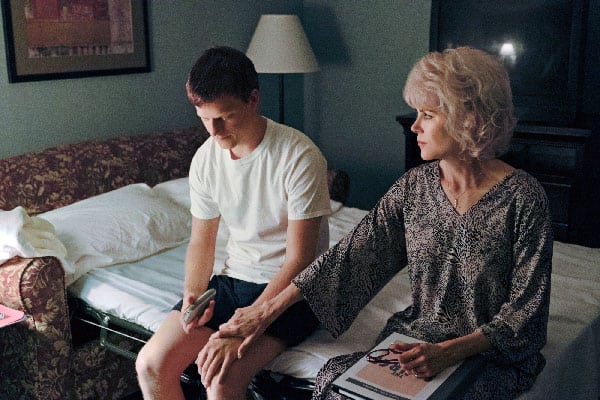Boy Erased (2018)

DIRECTOR: Joel Edgerton
CAST: Lucas Hedges, Nicole Kidman, Russell Crowe, Joel Edgerton
REVIEW:
Boy Erased, the second directorial feature of actor Joel Edgerton and based on the memoirs of Garrard Conley (with names changed to protect both the innocent and some not-so-innocent), is not a feel good viewing but a worthwhile and important one. Conley’s memoirs, and now the film adaptation, shine a light on the long-running practice of so-called “conversion therapy”, a phrase which may not even be familiar to some viewers. Performed most often on underage children, and roundly debunked by virtually every reputable psychiatrist as both ineffective and unethical and psychologically harmful, conversion therapy aims to “convert” an individual with homosexual or bisexual inclinations into a heterosexual. To this end it uses a step-by-step program of indoctrination including techniques amounting to both psychological and physical abuse. While increasingly a discredited practice and banned in a growing number of states, conversion therapy remains legal on the books in thirty-six states. By telling one former patient’s story, Boy Erased offers both a frank condemnation of the insidious quackery of conversion therapy, and the dramatically compelling true story of one young man who emerged triumphant on the other side.
We open with Jared Eamons (Lucas Hedges) already beginning his commitment to the conversion therapy program, with a series of interspersed flashbacks sketching out what led up to this point. Jared grows up in Arkansas as the son of devout pastor Marshall Eamons (Russell Crowe) and his loyal wife Nancy (Nicole Kidman). Jared is a model son and initially outwardly considers himself heterosexual, though he avoids intimacy with his girlfriend (Madelyn Cline) and breaks up with her before leaving for college. At college, Jared has two same-sex experiences at opposite ends of the spectrum, first sexually assaulted by his roommate (Joe Alwyn), then later having a tender (and not overtly sexual) encounter with a young artist (Théodore Pellerin). When Jared eventually comes to the conclusion that he is gay and confesses his homosexuality to his horrified parents, Marshall consults with church elders and enrolls Jared in the so-called “Love In Action”, a conversion therapy program presided over by Victor Sykes (Joel Edgerton). Jared’s initial impression is positive, but the more time that goes by and the more he observes of Sykes’ methods, the more disturbing he finds it. Meanwhile, his initially naive mother Nancy slowly develops doubts, eventually comes to share her son’s apprehension, and ultimately comes to the rescue when he needs her most.
Probably the most important thing that Boy Erased does right is to steer clear of over-the-top melodrama and present nuanced perspectives. Despite much of it taking place within the chilly environment of the inappropriately-named Love In Action, the film remains steeped in empathy, both for the boy undergoing conversion therapy and for the misguided parents who send him there. Russell Crowe’s pastor doesn’t launch into any fire and brimstone Bible-pounding anti-gay sermon—in fact, Crowe is exceptionally low-key and subdued—and even Sykes, while hardly a sympathetic figure to most viewers, is not made into a cartoonish villain. It could have been easy—and more simplistic and less intelligent—to present the parents in more one-dimensional negative light, but the movie shows perceptive understanding and empathy—if not always agreement—-toward conservative, devoutly religious families like the Eamonses, to whom their faith is of utmost importance. Marshall and Nancy are not intentionally abusive parents; they are earnest and sincere and well-intentioned, they believe that homosexuality is a sin, that it can be changed, and that enrollment in Love In Action—which they naively neglect to vet or research—is for Jared’s own good. Nancy undergoes the most substantive character arc, shifting from a loyal pastor’s wife who falls in line behind her husband to taking matters into her own hands to come to her son’s rescue. For the stern, inflexible Marshall, it’s not that easy. By the end, there is a tentative flicker of reconciliation between father and son, but while a less true-to-life movie might pretend everything is magically swept aside by a dramatic declaration of love and kumba yays, Boy Erased doesn’t try to pretend it’s that simple.
And while Jared is squarely the center focus, the other boys enrolled in Love In Action are distinct individuals, including some like Jon (Xavier Dolan), who believe in the program and are fanatically committed to their “conversion”, others like the effeminate Gary (Troye Sivan), who are playing along to secure their release, and others like the sullen Cameron (Britton Sear), whose reluctance to cooperate makes him a focus of Sykes’ browbeating, with tragic consequences. The program itself makes a benign first impression, steeped in reassuring phrases like “Love In Action”, but is gradually exposed as relying on psycho-babble (like a cliched quack psychiatrist, Sykes attempts to convince each boy that they subconsciously hate their fathers), a staff of questionable education and qualifications (Nancy has doubts after flipping through her son’s handbook which is filled with obvious grammatical errors), psychological and physical abuse, and intimidation; their cell phones and journals are confiscated, and Sykes even has a creepy enforcer (Flea) to keep the boys in line. At times, especially within the prison-like halls of Love In Action, Boy Erased has vibes of a low-key psychological horror movie (a not altogether inappropriate comparison), but things are kept low-key enough not to become overdramatized or for the movie to lose its feel of down-to-earth authenticity which, in some cases, makes it heartfelt and poignant, and in others makes it disturbing. For this, screenwriter-director Joel Edgerton and the entire cast deserve due credit.

The performances are credible across the board. Lucas Hedges capably navigates Jared’s journey, from a confused, troubled young man who initially hopes that perhaps he can be “fixed”, to going along to get along in Love In Action’s clutches once he realizes its quackery, and to finally achieving a personal triumph and emerging the other side as stronger and more self-assured, both in his identity as a gay man and in the way he asserts himself with those around him. Hedges’ performance is low-key and often quiet and stoic, but he has three strong ending scenes, first his final confrontation with Sykes, then a moving conversation with his mother, and finally a low-key, tentative, poignant ending meeting with his father. The most obvious arc, however, goes to Nicole Kidman, sporting a platinum blond perm and looking the part of a Southern housewife, whose Nancy goes on a journey of her own from passive pastor’s wife to protective mama bear. Russell Crowe, more portly than ever, avoids demonizing Marshall, who could have been a “villain” in lesser hands but here is a torn, misguided figure who is too rigidly set in his ways to follow his wife down the road to a personal transformation. Marshall loves his son, but cannot reconcile his son’s homosexuality with his devout belief that it is a sin. The only character to really receive the script’s disdain is Joel Edgerton’s Sykes, sporting a twirl-worthy mustache and oozing the polished oily charm of a televangelist, full of slogans and questionable psychiatry, ultimately exposed as an unqualified charlatan; in a final irony, the man Sykes is based on, John Smid, eventually not only renounced conversion therapy, but came out as homosexual himself. Both Sykes and Joe Alwyn’s self-loathing sexual predator Henry show the destructive effect internalized homophobia can have not only on individuals, but those around them. Smaller roles are filled out by some cast members who are primarily known for things other than acting, including openly gay South African singer/songwriter Troye Sivan, Canadian director Xavier Dolan, and Red Hot Chili Peppers bassist and founder Flea, but viewers worried about any of them being a weak link can relax. Everyone acquits themselves credibly, and not a single cast member breaks the feel of authenticity.
Boy Erased may be a difficult viewing experience, especially for those with personal experience with conversion therapy or other forms of homophobia, but it’s a film that, while hardly the feel good movie of the year, is important and should be seen, if only to bring the realities of conversion therapy to light to a wider audience. And while it portrays a series of injustices, its ultimate message is hopeful and optimistic (Jared and the man he’s based on, Garrard Conley, ultimately ends up a successful author living in New York City with a circle of friends and a boyfriend, far away from the prison-like halls of Love In Action). If the movie shows an example of how the road to hell can be paved with good intentions, it also shows that so too can the road to compelling and powerful true-to-life drama.
* * *